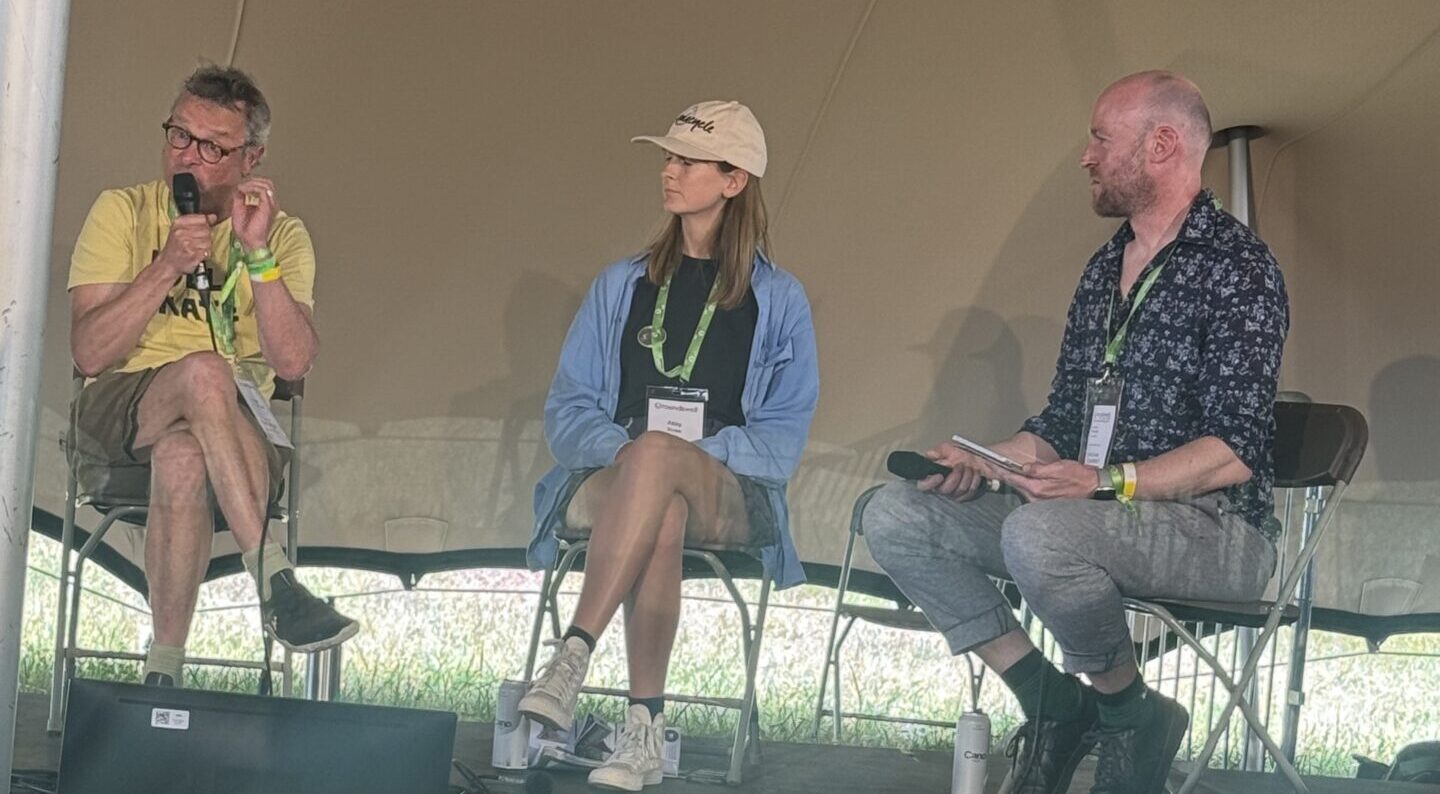
When I turned up to the regenerative ag festival Groundswell this year, I didn’t expect to hear a farmer sit on stage and tell everyone that, in a moment of desperation, he’d gone to South America and taken the psychedelic brew ayahuasca.
If you’d told me 10 years ago that I’d be sitting at a farming conference listening to a farmer with a thick Welsh accent earnestly discuss how this trip (hello pun!) had influenced his farming strategy, I’d have assumed you were the one on hallucinogens.
Yet it’s also not all that surprising. As I reported after last year’s Groundswell, there’s an increasingly personal tone to the conversation around regenerative agriculture; well, agriculture in general, in fact. Just this week on the BBC’s Farming Today show, the topic of depression featured in not one but two stories in a mere 12-minute segment.
Morgan, the Welsh farmer who was chatting to the legendary Regen Ben (Ben Taylor-Davies) in the Earthworms pub stage at Groundswell, told the audience that at 27 years old, struggling with anxiety and raising a young family as a farmer, he took the radical decision to try ayahuasca, a psychoactive brew traditionally used by Indigenous cultures in the Amazon and Orinoco basins and said to have therapeutic effects.
“It shifted my awareness of what I’ve been doing with my life and where I’ve been going wrong. It also built me up into sort of a person that I could be in my life and after I’d been there a week and experienced all these different things, I came back onto the farm and thought, right, I’m gonna be a regen farmer.”
It wasn’t an overnight success. He lost £150,000 in the first year, which surprisingly led him to take another trip to South America, where he was encouraged to slow down. From here, he learned about meditation and breathwork, which he now practices with other farmers.
“And then as I was going into the process, I reached out to [Regen] Ben, and he came down, we talked about potatoes and cover cropping, and herbal leys. And very quickly, I realized that Ben needed a lot of help, so we got him into a breathwork class.” Morgan then invited the audience to join a breathwork session he was holding at Groundswell.
Farmer stoicism, from Wales to Costa Rica
While I didn’t grow up in a farming family, I was around a fair bit of agriculture as a child, funnily enough, in both Wales and Latin America.
Our Welsh friends Brian and Soo ran a dairy farm, and if I’d suggested a breathwork session to Brian, I would have been laughed out of the room! My London-ness was already a stark difference between us, and he loved getting my grumpy teenage ass up early to help with milking, coming back for breakfast covered in mud. It was hard work (for him!) but he grinned and put up with it.
On my uncle’s dairy and huerta (market garden) in Costa Rica, where I spent some months after school, my ‘co-workers’ Ricardo and David were also no-nonsense, practical men who rarely shared much about their personal lives, let alone their emotions.
Stories like Morgan’s might seem extreme, but they reflect a broader shift in farming culture from the stoic “grin and bear it” mentality that’s characterized much of the sector until now. Whether it’s through ayahuasca ceremonies or simply being more open about daily struggles, it seems farmers are increasingly willing to share their vulnerabilities. This new openness is appearing everywhere – from small family farms to major media personalities.

Even TV hard man Jeremy Clarkson was visibly upset on his TV show Clarkson’s Farm when several of his piglets died. Speaking on the Telling the Regenerative Story: Farming in Media & Culture panel at Groundswell, Vicky Hoy, producer of Clarkson’s Farm, recounted the experience as “heart-wrenching” and noted that it showed a side of Jeremy Clarkson viewers hadn’t seen before.
He became very vulnerable and began to blame himself, asking his colleague Caleb Cooper, “Am I doing something wrong? Is this me?” This led to a powerful moment of connection where Caleb reassured him, saying, “Look, mate, you’re actually a really good pig farmer, and this is not your fault.”
Beyond the headlines
This kind of raw emotional authenticity isn’t just powerful for the farmers themselves; it’s also resonating with their audiences. As journalists are taught, “if it bleeds, it leads,” and a panel of media personalities and producers confirmed that emotional vulnerability in farming stories is no exception.
“If you don’t thread [practical advice] together with a genuine, real emotional journey, then I don’t think you’re going to get people tuning in,” Hugh Fearnley-Whittingstall of River Cottage fame told the audience.
Coming from the land of stiff upper lip-dom (the UK), it feels quite remarkable to have one of the toughest sectors out there–with some of the toughest people in it–increasingly open up about personal struggles.
When I first started covering this industry nearly 12 years ago, the industry was still so little understood by the general public. Friends rolled their eyes in boredom when I said I wrote about agriculture. Now they reference Clarkson’s Farm and ask if I’ve tried Wildfarmed bread.
It’s also frequently in the headlines, but often for negative reasons, as livestock farming and agricultural emissions have become lightning rods in the climate debate. It can be easy to forget that there are real people behind these issues, and the criticism hits deep.
From those early days of watching Brian’s stoic resolve on his Welsh dairy farm to today’s farmers openly discussing ayahuasca journeys and mental health, I’ve witnessed a remarkable transformation in how farmers tell their stories.
While the industry grapples with its environmental impact and the future of food security, this new openness might be its greatest strength. Behind every controversial headline about farming’s carbon footprint lie countless farmers wrestling with change, sharing their struggles, and working to connect with the rest of us who depend on their work to feed ourselves and our families.
The post From stoicism to psychedelics, farming’s new emotional honesty could be its greatest strength appeared first on AgFunderNews.




